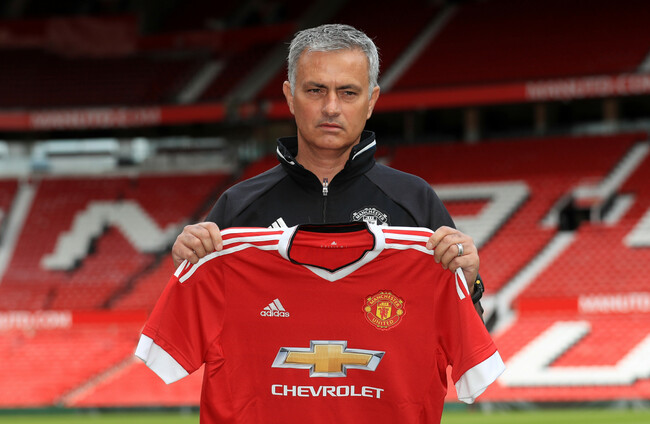THE WARNING SIGNS were there for all to see during a frustrating summer tour in the United States, but it took another five months before Manchester United and Jose Mourinho would finally part ways, the pair’s relationship today deemed beyond repair.
With the announcement on Tuesday morning that club and manager had gone their separate ways, United currently sit sixth in the Premier League table 18 points adrift of rivals Man City in a season where both were tipped as obvious title contenders. One has lived up to that billing and the other has sank.
Mourinho entered the fray at Old Trafford with the difficult task of doing what David Moyes and Louis van Gaal could not, which was to bring a league title back to the Theatre of Dreams and help restore former glories in a post-Ferguson era of growing uncertainty.
His first season did not deliver on that aspiration. Europa League and League Cup titles proved that the Special One could still secure silverware like he had done throughout his whole career, but also bought him time to implement his ideas and recruit his own signings. No league title, but a firm foundation of initial success, a springboard towards Premier League success in the near future.
A disappointing second season, where United finished 19 points behind Pep Guardiola’s champions and exited the Champions League in the knockout stages to Seville, followed. It was a year in which relationships in the dressing room and in the board room began to deteriorate, and an underlying frustration with a hard-to-love style of play came to the fore amongst some sections of supporters.
This year that deadly combination of the club’s board not giving the green light for key signings (much-needed centre backs), losing the faith of his dressing room, a conservative style of play and poor results proved deadly, with the Portuguese given the boot less than halfway through the season.
It is the third time the infamous “third season syndrome” has come to haunt Mourinho, with back-to-back sackings at Chelsea and now Old Trafford raising interesting questions as to where the manager’s future now lies.
Both Man United and Jose Mourinho are not the superpowers they were ten years ago. Both enjoyed immense success throughout a glittering 2000s, but now are suffering through individual crises of identity, both uncertain of what they represent and where success in the future will come from.
The 2015/16 season was the first since his FC Porto days that Mourinho had finished anywhere below third place in a league season, with today’s sacking not coming out of the blue, but rather the culmination of a host of problems which Mourinho has suffered in the past before.
The general theory about Mourinho’s third season syndrome is that the emotional intensity of his methods eventually burns out, his management style not able to be maintained beyond three seasons at any club, whether Chelsea, Real Madrid or Man United.
Failing to secure the signings he asks for, falling out with key players like Iker Casillas at Madrid, Juan Mata at Chelsea and and Paul Pogba at United, and a deteriorating relationship with hierarchy figures like Roman Abramovic, Florentino Perez and Ed Woodward have escalated an underlying malaise in each instance.
Mourinho is not the type of manager to build a prolonged period of success at just one club like Alex Ferguson with United, Pep Guardiola with Barcelona or Arsene Wenger with Arsenal. A dynasty. Rather his success comes in short bursts — an approach which, up until recently, has served him well.
After each sacking; Chelsea in 2007, Madrid in 2013 and Chelsea again in 2015, he has succeeded in resurrecting himself and coming back — if not stronger — still capable of leading some of Europe’s elite clubs to domestic and European success.
During the past two seasons at Old Trafford the accusation has been labelled at Mourinho that his best days are behind him and that his methods of management are out of date with a new generation of footballers.
Critics say the generation gap between the 55-year-old and a new age of Instagram-using, Snapchat-enjoying, selfie-taking stars has created a disconnect where he can no-longer relate to his dressing room or communicate his message in an effective manner.
That said, it should not be forgotten that Mourinho won the Europa League just 20 months ago and secured the Premier League for the fourth time in his career only three and a half seasons back with Chelsea.
With that recent record of success, as well as his career-highs of Uefa Champions League achievements with FC Porto and Inter Milan in the past, it seems unlikely that in just four seasons he has lost the ability to motivate a squad of elite players towards a league title.
Mourinho won titles in the 2000s and he has won titles in the 2010s, he will be the first man to tell you that and rightly so. But with back-to-back sackings with Chelsea and Manchester United, his stock has sunk to its lowest ever point in his career.
Job offers will not be in short supply, but the destination of Mourinho’s next arrival will tell all of us what his true ambition are — it is worth remembering that after being sacked by Leeds United, Brian Clough rallied and led Nottingham Forrest to back-to-back European Cups.
Mourinho is a highly ambitious manager and one who will be adamant to prove his critics in the media wrong by coming back even stronger from this most recent dismissal.
He has often been linked with PSG in the past and has also spoken about the possibility of leading his native Portugal. Euro 2016 saw Portugal break their duck and secure their first piece of international silverware, meaning Mourinho’s ambition to be the first man to do so is no-longer a possibility.
China represents another opportunity, a massive wage packet for someone who has the ability, media profile and charismatic charm to light up any and every league he arrives into.
There will be endless offers, but unlike in 2004 when Chelsea made Mourinho their top priority, or in 2010 when Real Madrid were banging down his door, the very top jobs in European football are no-longer within his reach.
He will be intent on making sure his shortcomings at Man United are remembered as nothing more than blips in a career where he has been recognised as one of the greatest managers in the modern game.
The question then hangs tentatively in the balance as to what Jose Mourinho’s own future ambitions are. He has left behind a wreckage of mistakes and missteps at Old Trafford, with United scrambling in the post-Ferguson dark to pinpoint who they are as a club and what they represent.
Mourinho, too, has much soul-searching to do if he is to rage against the dying of the light. To try and make sure that his legacy in England is recalled in future years for his three Premier League titles, and not his two sackings.
Originally published at 16.16
Subscribe to our new podcast, Heineken Rugby Weekly on The42, here:
















Mad to think Denmark scored more in the Aviva than South Africa in the rugby
Though there were mistakes throughout by management, anyone who thinks the solution is to bring in a new messiah and to try and play attacking football is not looking deep enough. Of any of the fifty or so possible starters for an Irish team, the only one who could play that style is arter.
Dublin has a much lower population of GAA players than soccer, yet produces Diarmuid Connolly and Ciarain Kilkenny, both players who are wonderful passers of a football, with vision and attacking creativity. Soccer in Dublin produces no such players.
Irish soccer needs an overhaul similar to the one Belgium had in 2000, Spain had in 94, and Germany had in 2002. The style has to change from the age of six. Otherwise, it’s a long freewheel downhill from here
@Chucky Arlaw: the FAI have an awful lot to answer for. Useless
@Chucky Arlaw: are u saying the only player in the panel capable of playing good football is Arter?? Is that correct or have I misunderstood something?
So if McCleans shot goes in and the dynamics of the game change, and we hold on for an hour, we have no such problems in our game anymore? Give it a rest you bore it’s one game we got smashed cos of 2 sloppy goals in 3 minutes which was effectively the game ender. Put the fossil brush and magnifying glass away you pretentious aul eejit.
The North were brave when they appointed Micheal O’Neil and were rewarded. A league of Ireland manager who was progressive, on an upward curve in his career not winding his career down.
Why not take a punt on Stephen Kenny, he’s shown that he can coach players of a certain standard to perform well past expectation and win games against teams with vast superior resources.
The lack of preperation and lack of belief in the players ability means its time for a change at the helm. Would give anything to see Chris Hughton given a go
The north and south join up now stop this silly politics
@Aidan O: pour one bucket of muck into another bucket of muck, you just end up with a big bucket of muck.
@Aidan O: We already have players from the North; Duffy, McLean, O’Kane etc
European championship failure!
Not to worry. We still have John Delaney.
More failure on other international stages.